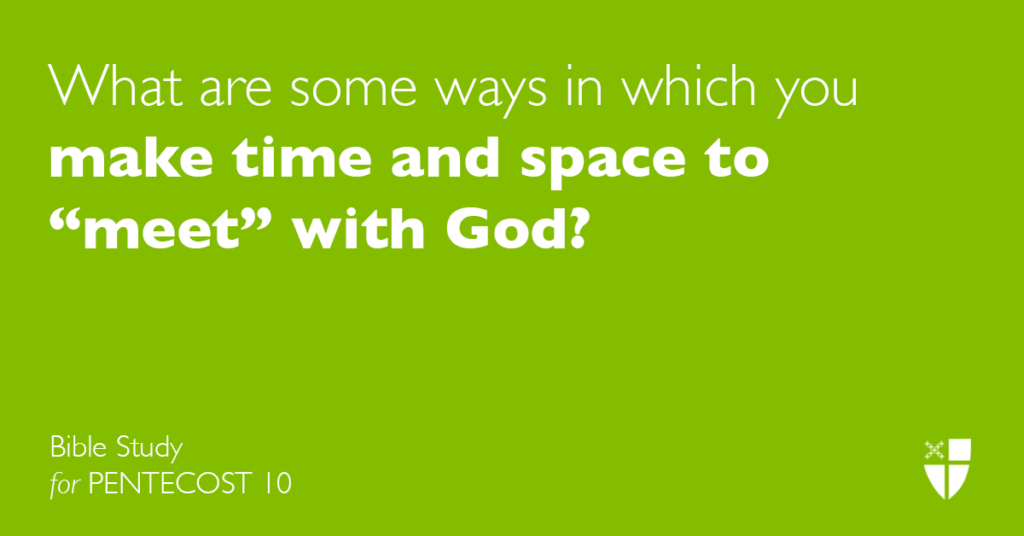This page is available in: Español
Bible Study: Proper 13 (B) – 2021
August 01, 2021
RCL: 2 Samuel 11:26-12:13a; Psalm 51:1-13; Ephesians 4:1-16; John 6:24-35

2 Samuel 11:26-12:13a
I have always wondered how it was that David justified to himself all the plotting he did to get Uriah killed because it was no small feat to get such an honorable and skilled warrior in trouble. But David did succeed, and perhaps part of him knew how wrong it was to seek his self-interest like that. Perhaps that is why he does not hesitate to say that the man in Nathan’s story should die. He has a strong visceral reaction and he also clearly recognizes right from wrong. He just didn’t allow himself to see it in himself, or maybe he thought he could get away with it.
There is that saying that we are our true selves when we think no one is watching. Beyond the reality that God is our present witness and knows what we are doing, we are also watching, we are also witnesses to our own actions and behaviors. Perhaps we should think more about the impression we make on ourselves in our decision-making. In that intimate space between ourselves and God, we need to be fully honest.
- Have you ever seen behavior that was appalling in someone else, but failed to see it within yourself?
- How do you see the grace of God working in this story?
Psalm 51:1-13
The theme for today seems to be the intimate space we share with God, within ourselves. The place where we open up and God can see us fully and be with us fully. Some achieve this through prayer, others through meditation, others through Lectio Divina. No matter the means, what is important is being there together with God, in that place where he creates the “clean heart” and renews the “right spirit”. The psalmist first asks God to be treated according to God’s loving-kindness, which is not the retributive justice system, but God’s justice system, where love can and will transform us in ways we cannot even imagine.
- Have you ever felt that closeness to God makes you intuitively understand God better?
- What are some ways in which you make time and space to “meet” with God?
Ephesians 4:1-16
This is difficult advice that Paul gives when he encourages the Ephesians to “[bear] with one another in love, making every effort to maintain the unity of the Spirit in the bond of peace.” What does this mean in the world in which we live today, where conversations of race and equality are abounding? I am always afraid that the interpretation might give some power to those that marginalize and oppress, but a closer look at the text tells me that is not the case. If we do bear all people in love, if we treat all people as our beloved family members, perhaps we could more easily see where they are coming from and give them a lot more grace than we might a stranger. Perhaps the gift that the church needs right now is someone that will radically love all people, but especially those that have been historically kept away from our doors, who have not been part of our church unity, those in whose face we have shut the door in the past. The greatest gift that we can share with others is love.
- What does it mean to bear someone in love?
- Do you recognize your own gifts for the world and for the church?
John 6:24-35
Jesus sometimes seems to be mysterious on purpose. Of course, communication is always on two levels with him, a human level and an eternal level. He seems to answer the questions people ask him, but in a way that makes things so much more complicated. A thesis might be needed to unpack all of it! I find myself sometimes not understanding intellectually what Jesus says because I am not a scholar, but then I close my eyes and think about Jesus saying, “I am the bread of life.” In a mysterious way, that somehow makes sense. My heart, seeking Jesus and closeness to God, understands what the mind does not. In the intimate space between God and me, my intellectual shortcomings matter less, because I can understand what it means to be nourished and connected without having the words to explain it.
- What are some spiritual things that nourish and sustain you in your day-to-day life?
- What spiritual practices are the ones you feel bring you closest to God?
This page is available in: Español
Don’t forget to subscribe to the Sermons That Work podcast to hear this sermon and more on your favorite podcasting app! Recordings are released the Thursday before each liturgical date.
Receive Free Weekly Sermons That Work Resources!
This page is available in: Español


